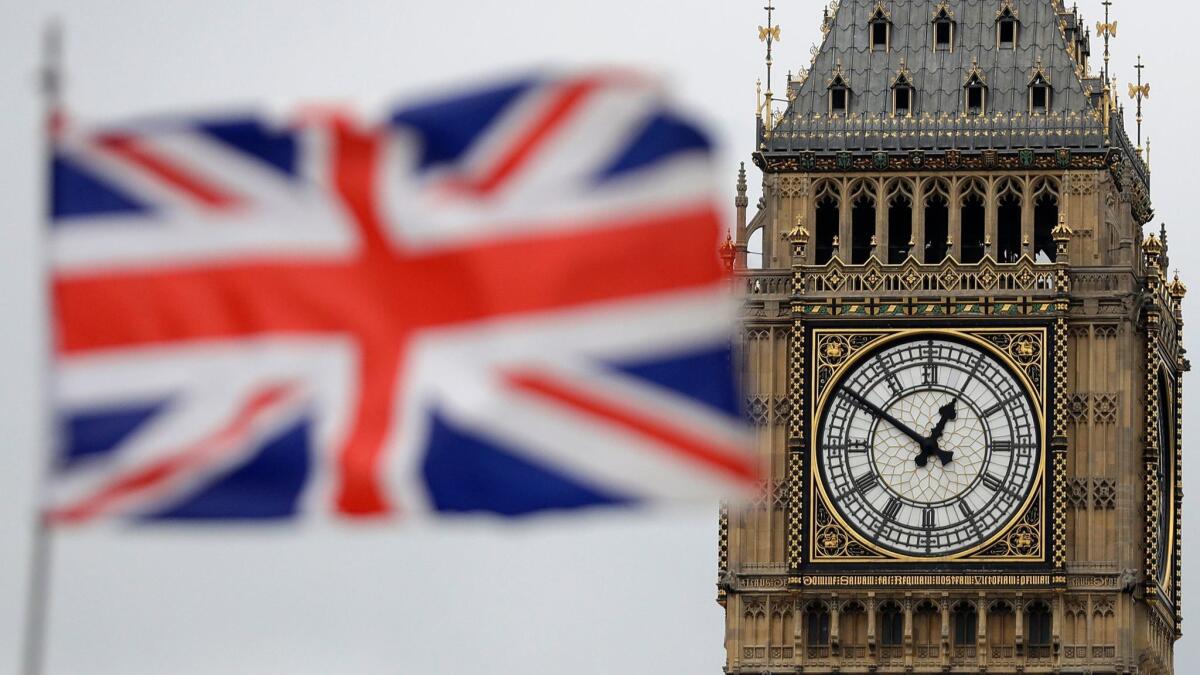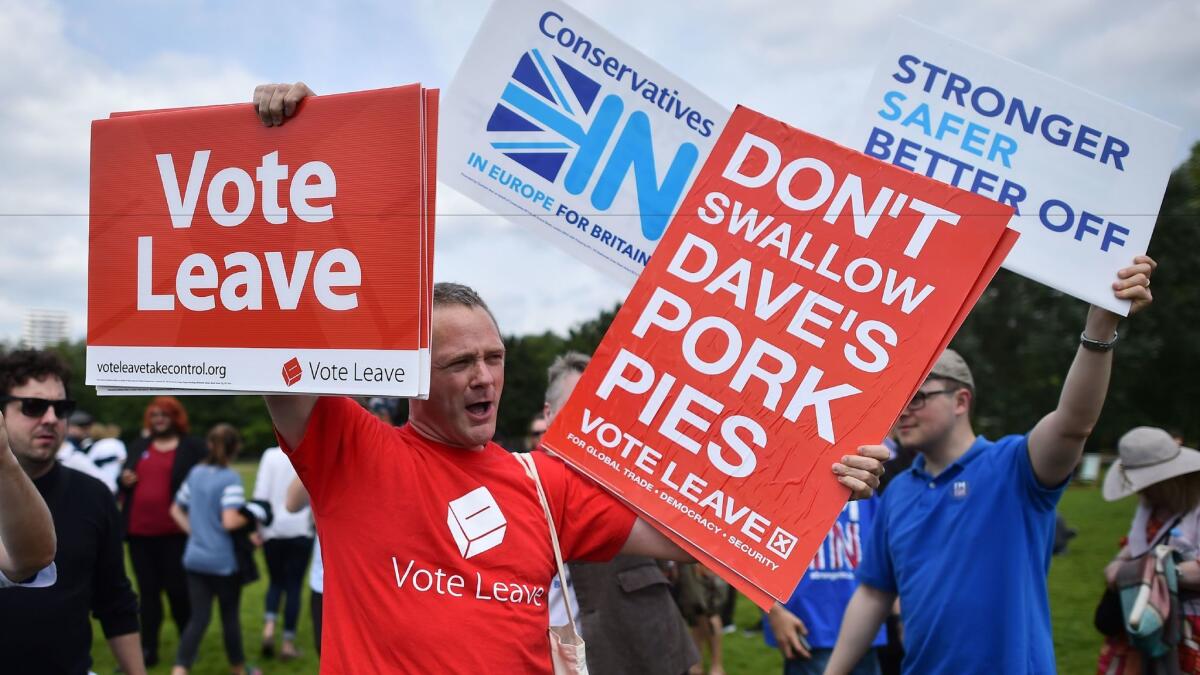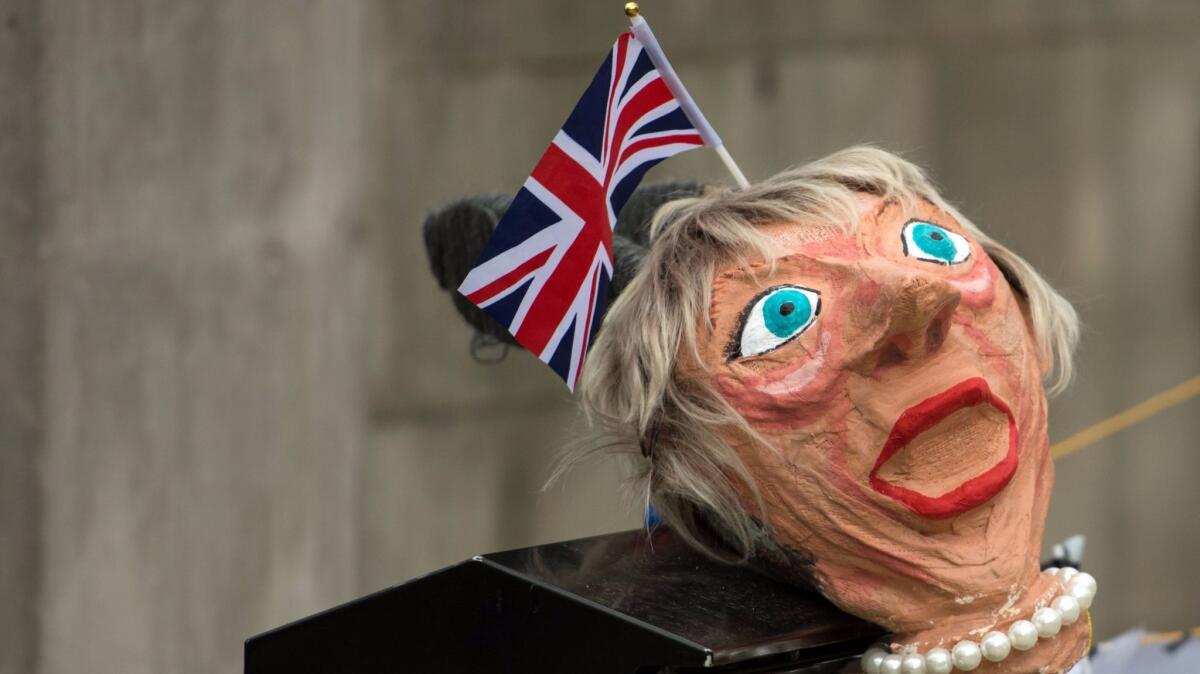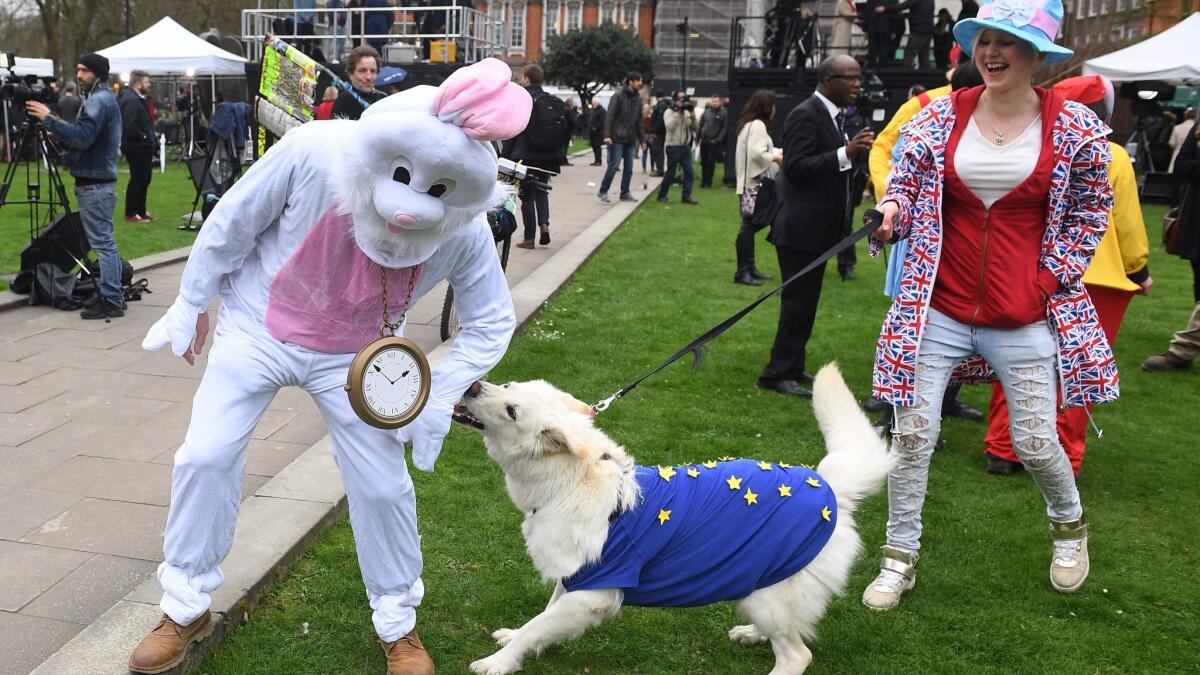Now that the clock is running on ‘Brexit,’ here’s what you need to know

- Share via
The two-year countdown began Wednesday toward Britain’s official departure from the European Union, raising a question: What happens now?
There will be deals to work out, among them trade, legal agreements, and the rights of British expatriates living in EU nations. British Prime Minister Theresa May called the move to leave the EU, dubbed Brexit, a “unique opportunity” to “shape a brighter future” for the country. But there will likely be several pitfalls to navigate before March 29, 2019, the deadline for signing off on a final agreement.
“There is no precedent for this.” said Kal Raustiala, professor of law and director of the Burkle Center for International Relations at UCLA. “It’s hard not to imagine that this wouldn’t be one of the most protracted and difficult negotiations in European history. This is going to be really, really quite complex.”
Here’s a look at how and why Britain got to this point and the rocky road ahead.
Why did Britain decide to vote on leaving the EU?
Following a contentious campaign, a referendum was held on June 23, 2016, to decide whether the United Kingdom — England, Wales, Scotland and Northern Ireland — should end its 44-year membership in the political and economic confederation of 28 European states. The vote to leave the EU won by 51.9% to 48.1%, in what was the highest turnout for a British-wide vote since the general election of 1992. A record 71.8% went to the “Brexit polls,” with more than 30 million people voting.

Who wanted to leave and who wanted to remain?
Britons in the “leave” camp blamed permanent immigrants and temporary residents from other EU countries living in the U.K. for undercutting wages, exploiting benefits such as access to housing, and for the longer waits for services, like healthcare. Fears over the possibility of would-be terrorists slipping into the country among the recent flood of migrants to Europe from Syria, Afghanistan and Africa, and dissatisfaction over what many Britons viewed as efforts by the EU to dilute the authority of individual member states, were among the other factors influencing those who voted to leave.
Britons who supported the “remain” campaign argued that EU migrants were good for the country because they fuel economic growth, and many were employed in blue-collar jobs that some British citizens don’t want to do. The anti-Brexiters also pointed to the benefits of Britain’s participation in the single EU market, where it faces no import or export tariffs, together with the advantages that British citizens have to travel and live in EU member states without a visa. The remain camp also argued that leaving would hurt jobs, living standards, housing prices and Britain’s long-term economic stability.
What happened after the referendum?
Former Prime Minister David Cameron resigned and Theresa May was elected by members of her conservative party to take the helm and begin the process toward triggering Article 50.

What is Article 50?
It’s part of an EU law, the 2009 Lisbon Treaty, which sets in motion and lays out the ground rules for the process of withdrawing from the EU — something that no country has done before.The terms of Britain’s withdrawal have to be negotiated with the remaining EU member states.
What are some of the issues up for negotiation?
Trade is a big one. Britain will have to negotiate a new trade deal with EU nations. May has made clear in recent months that the UK does not intend to remain in the EU’s single trade market, but Britain will try to maintain access to this market on similar terms as other member states — namely, the free flow of goods and services.
“The EU will try to drive a fairly hard bargain, not necessarily a punitive one, but one that is sufficiently tough that it would deter other would-be exiters,” said Raustiala, the UCLA professor. “There’s going to be a fair bit of brinksmanship and bluffing on both sides.”
If there is no agreement at the end of two years of negotiations with the EU, the U.K. will be subject to World Trade Organization rules, which means trade tariffs on all goods sold to the EU.
There’s also debate over how Britain will deal with trade disputes since it will no longer fall under the authority of the European Court of Justice. And the British Parliament will have to repeal the European Communities Act, which gives EU law preeminence in the U.K.
The British Parliament will have to rescind, amend or maintain other EU agreements, running to some 80,000 pages.
Decisions will have to be made about the rights of British expatriates living and working visa-free in EU countries, and reciprocal agreements for EU nationals residing in the U.K. Cross-border security arrangements, the European Arrest Warrant (which is valid throughout member states), relocation of EU agencies which have their headquarters in the U.K., and the U.K.’s contribution to pensions of EU civil servants, would also need to be ironed out, the BBC reported.

Will Britain be better off?
Depends on whom you ask. Proponents of Brexit back Prime Minister May’s assertion that Britain now has a chance to “shape a brighter future.” May also maintains that Brexit would give Britain greater power over decision-making and the ability to “take control of the things that matter most to us.”
But some experts believe there will be more pain before joy, and some signs of discomfort are already apparent.
Since the referendum, the British pound has significantly declined against the U.S. dollar and the euro, and inflation rose to 2.3% February — its highest rate for three-and-a-half years — according to the BBC.
There have also been reports of bank and businesses relocating, or exploring relocation, to other capitals.
“What Britain is going to realize is that markets have no flag and historical loyalty is minimal,” said Nicholas Cull, a professor of public diplomacy at USC Annenberg School of Communication and Journalism. “They’re going to go where the deal is best. Right now, it’s unlikely it’s going to be best in a Britain isolated from the European Union.”
“As the [Brexit process] moves forward, any happy landing is a long way in the future,” Cull said.
Could Britain change its mind, or later rejoin the EU?
On delivering the official exit letter to the EU president, May described the moment as “historic” and one “from which there can be no turning back.”
In reality, if the U.K. wanted to rejoin the EU, it would have to essentially start from scratch and there would have to be unanimous agreement from all other EU member states. Many of those countries are upset over the U.K.’s departure and might be hesitant to let the nation rejoin their ranks.
Special correspondents Kim Wilshire in Paris and Christina Boyle in London contributed to this report.
For more on global development news, see our Global Development Watch page, and follow me @AMSimmons1 on Twitter
ALSO
Lawmakers in Scotland back referendum on independence from Britain
‘Brexit’ begins as Britain gives formal notice of withdrawal from the EU
More to Read
Sign up for Essential California
The most important California stories and recommendations in your inbox every morning.
You may occasionally receive promotional content from the Los Angeles Times.










